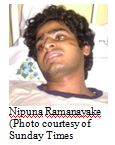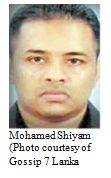SRI LANKA: The arrest of Vaas Gunawardena and the descent into rulelessness
 The Deputy Inspector General of Police (DIG) Vass Gunawardena is now in remand custody while an inquiry into the conspiracy to murder a businessman for pay is ongoing. Even as he is being interrogated he was reported in the television network, Suwarnawa Hini, in its programme on Mulpituwe (Front Page, which is a commentary on leading newspaper stories), as telling the investigating police officers that he is a murderer and that he “will take his revenge when he returns”.
The Deputy Inspector General of Police (DIG) Vass Gunawardena is now in remand custody while an inquiry into the conspiracy to murder a businessman for pay is ongoing. Even as he is being interrogated he was reported in the television network, Suwarnawa Hini, in its programme on Mulpituwe (Front Page, which is a commentary on leading newspaper stories), as telling the investigating police officers that he is a murderer and that he “will take his revenge when he returns”.
For over several years there have been many allegations regarding Vass Gunawardena. The attack on a student, Nipuna Ramanayake, by wife and son with the aid of two police officers working for the DIG (who was a Senior Superintendent of Police at the time), received wide coverage in the media. However, no criminal action has been taken on that issue as of today. The Fundamental Rights Application filed by the student was postponed for hearing until January 2014.
The execution-style killing of five persons following the killing of the brother of a local politician also received wide publicity. Vass Gunawardena was the Officer-in-Charge of the area within which these murders took place. It was also revealed that the actual murderers of the politician’s brother were not the five persons who had been murdered but some others who surrendered themselves to court later. There have been no arrests relating to these five execution-style killings.
 After Vass Gunawardena was transferred as the superior officer to the Kahawatte area in which there had been around 16 mysterious murders two of the accused, who were in custody for one of the murders and who were released on bail, disappeared and later according to reports, their bodies were found after being dumped. Again no one was arrested regarding these murders.
After Vass Gunawardena was transferred as the superior officer to the Kahawatte area in which there had been around 16 mysterious murders two of the accused, who were in custody for one of the murders and who were released on bail, disappeared and later according to reports, their bodies were found after being dumped. Again no one was arrested regarding these murders.
It was just a few weeks ago that Vass Gunawardena made his famous statement in which he told the police officers in the area under his control that if anybody assaults a police officer he had given permission to shoot them. He also said that he had issued guns and 20 bullets to each of these officers. He also said that he would take to task any officer who has not used those bullets in case any incident happened in the future. This statement was obviously made with the approval of the political authorities.
The media has widely reported the close connection between Gotabaya Rajapaksa, the Secretary of the Ministry of Defence and Vass Gunarwardena. At present the police operate under the Ministry of Defence. The Lessons Learnt and Reconciliation Commission (LLRC) in its final report recommended that the police should function as a separate institution and not under the Ministry of Defence. However, the government has rejected this recommendation and is quite keen to keep the police under this Ministry which is virtually under the control of Gotabaya Rajapaksa.
 The allegations of the murder of a leading millionaire businessman, Mohamed Shiyam, by way of a contract killing, executed by a DIG using police officers who work under him reflects the extent to which Sri Lanka’s policing system has descended to rulelessness and lawlessness. The case of DIG Vass Gunawardena is not an isolated one and if proper inquiries are made there is no doubt that many police officers, including many senior officers, will be implicated for crimes they have committed themselves as well as for covering up the crimes of others.
The allegations of the murder of a leading millionaire businessman, Mohamed Shiyam, by way of a contract killing, executed by a DIG using police officers who work under him reflects the extent to which Sri Lanka’s policing system has descended to rulelessness and lawlessness. The case of DIG Vass Gunawardena is not an isolated one and if proper inquiries are made there is no doubt that many police officers, including many senior officers, will be implicated for crimes they have committed themselves as well as for covering up the crimes of others.
The incident in which DIG Vass Gunarwardena is suspected of involvement does not come as any surprise. One of the most talked about issues in Sri Lanka in recent years has been the collapse of the public institutions through what is commonly known as politicisation. The police service is at the top of such politicised institutions. This debate is popularly known as the debate on the 17thAmendment to the Constitution or the debate against the 18th Amendment to the Constitution.
The descent of the police to a ruleless and lawless institution is part of the overall direction of a political system which is also ruleless and lawless. The 18th Amendment to the Constitution completed the descent into lawlessness which started with the 1978 Constitution. The limited reforms which attempted to undo some of the defects of the 1978 Constitution by way of the 17th Amendment to the Constitution was undone by the Rajapaksa regime in their adoption of the 18th Amendment.
Now rulelessness is threatening every area of life in the nation. The murder of a leading businessman, allegedly through arrangements made by a DIG of the police, reveals the extent to which even the business community itself is threatened. One businessman having a dispute with another or a landlord who has difficulties in evicting tenants and for that matter anyone else who has enough money to spend to get rid of an opponent can now have the assistance of the police themselves to have their nefarious designs carried out.
The arrest of the DIG, Vass Gunawardena should be taken as an occasion to fathom the danger that the entire country is now faced with due to a political system that prefers rulelessness as against the rule of law. This is a theme that the Asian Human Rights Commission has tried to highlight by repeated warnings over the last 15 years. Even at this late stage if conscientious persons within the Sri Lankan society, including the business community does not take this warning seriously they do so at risk of further peril to themselves.
On the other hand there is a general cynicism on the possibility of the investigating officers in this case having a free hand to conduct their inquiries with the thoroughness required of any criminal investigation. Skeptics believe that higher political authorities may interfere with this investigation due to the fear that many more crimes may be revealed in the process of a proper investigation. If that were to happen then the repercussions on the security of the business community and others would be enormously negative.



